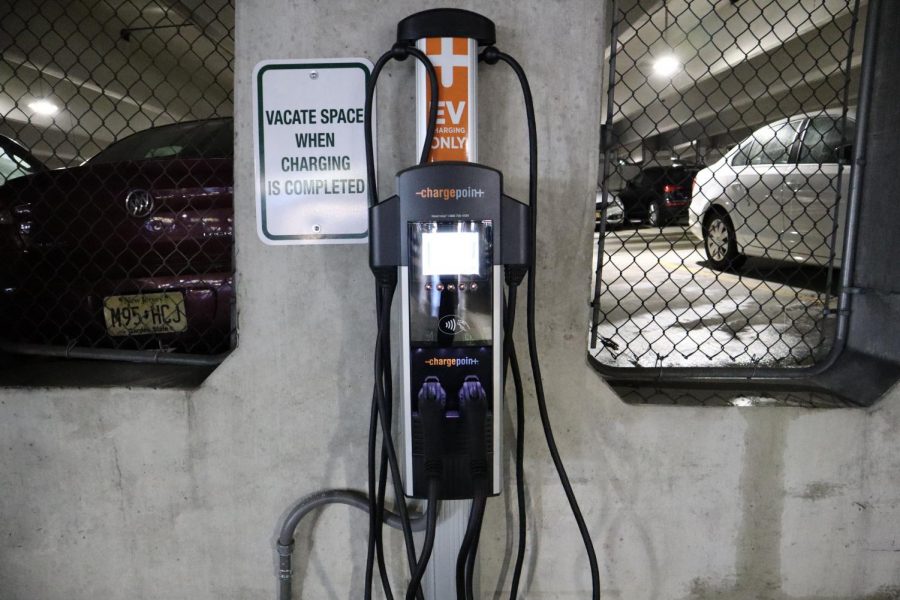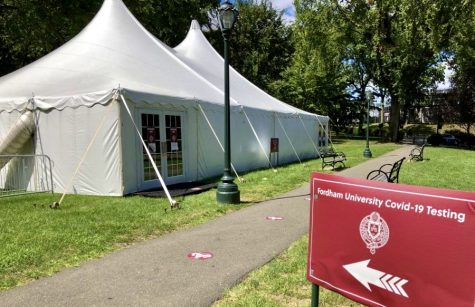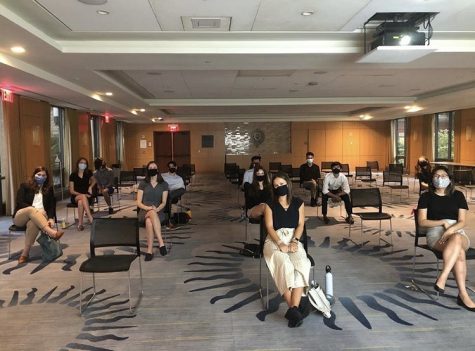Electric Vehicle Charging Stations Installed in University Parking Garage
Pia Fischetti/ The Fordham Ram
Using the chargers costs 25 cents per hour and they have a maximum of 4 hours per charge.
December 3, 2019
As part of an effort to serve electric car users and promote sustainability, the Department of Public Safety and Facilities Management installed eight electric vehicle (EV) charging stations on Ramp 2A in the university’s parking garage.
According to Michael McGinn, assistant operations manager of Public Safety, the university conducted research into how the chargers worked at other universities and looked into the leading manufacturer and world’s largest network of EV charging stations, ChargePoint, before going through with the installation process.
“They’re up and running and so far everyone seems to be very happy with them,” said McGinn. “There are eight chargers and four units in a great location at a pretty low cost.”
The entire process, including obtaining a grant to cover their cost, took a couple of months according to McGinn. The university worked with the New York State Energy Research and Development Authority (NYSERDA) to manage the project.
McGinn said the chargers, which were installed by the university’s facilities management, are solely being used by faculty so far.
“We’ve had lots of positive feedback and have had about a dozen people register for them as of now,” he said.
Colleen Cochran, FCRH ’21, leader of the Climate Impact Initiative in the Fordham Social Innovation Collaboratory, said the installation is a step forward in cultivating a climate conscious culture at Fordham.
“They were working towards installing EV chargers last year, and it’s exciting to see it now fully implemented,” Cochran said. “For many people, a barrier to switching to an electric car is the accessibility of EV chargers. Having a charger on campus incentivizes members of the Fordham community to make the sustainable switch to an electric vehicle.”
Based on how other companies and universities use the chargers, McGinn said the university has placed a four hour time limit per charging spots in order to maximize the number of charges it can provide daily. When a car is fully charged, a user gets a notification from the ChargePoint app indicating that the car is done charging, according to McGinn.
“They’re 25 cents per hour which covers the kilowatt hours that are needed to cover the university’s utility costs and also the administrative costs of the program, including the cloud services that ChargePoint charges the university yearly,” he said.
According to McGinn, EV charging stations usually run from 50 cents to a dollar per hour. He cited the chargers, along with Fordham’s recent installation of solar panels, as an effort by the university to show commitment to sustainable practices.
Gabby Perez, FCRH ’21, co-president of Students for Environmental Awareness and Justice (SEAJ), said she hopes the university would advertise its sustainability projects better so that the Fordham community could be better informed. She suggested the university should update information regarding sustainability on its website.
“I hope that having these EV chargers leads Fordham towards switching out their own fossil-fuel-using cars (Public Safety Cars, Ram Vans) for electric vehicles sometime very soon so that Fordham’s own vehicles can use these new EV chargers,” said Perez.
McGinn said the university plans to analyze how it adjusts to having the chargers for the next six months and take it from there.
Lily Round, FCRH ’20, co-president of SEAJ, said the university cannot stop here and explained further steps for the campus to be considered a sustainable one.
“It’s a good step, and electric cars are a good alternative to oil. However, we still need to move completely to renewables,” Round said. “I want to see the university move to 100% renewables and supply those charging stations from renewable energy sources.”












If you want a picture to show with your comment, go get a gravatar.